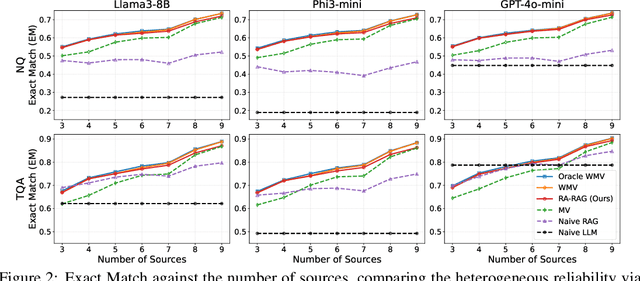Jeongyeon Hwang
Retrieval-Augmented Generation with Estimation of Source Reliability
Oct 30, 2024



Abstract:Retrieval-augmented generation (RAG) addresses key limitations of large language models (LLMs), such as hallucinations and outdated knowledge, by incorporating external databases. These databases typically consult multiple sources to encompass up-to-date and various information. However, standard RAG methods often overlook the heterogeneous source reliability in the multi-source database and retrieve documents solely based on relevance, making them prone to propagating misinformation. To address this, we propose Reliability-Aware RAG (RA-RAG) which estimates the reliability of multiple sources and incorporates this information into both retrieval and aggregation processes. Specifically, it iteratively estimates source reliability and true answers for a set of queries with no labelling. Then, it selectively retrieves relevant documents from a few of reliable sources and aggregates them using weighted majority voting, where the selective retrieval ensures scalability while not compromising the performance. We also introduce a benchmark designed to reflect real-world scenarios with heterogeneous source reliability and demonstrate the effectiveness of RA-RAG compared to a set of baselines.
MedBN: Robust Test-Time Adaptation against Malicious Test Samples
Mar 28, 2024



Abstract:Test-time adaptation (TTA) has emerged as a promising solution to address performance decay due to unforeseen distribution shifts between training and test data. While recent TTA methods excel in adapting to test data variations, such adaptability exposes a model to vulnerability against malicious examples, an aspect that has received limited attention. Previous studies have uncovered security vulnerabilities within TTA even when a small proportion of the test batch is maliciously manipulated. In response to the emerging threat, we propose median batch normalization (MedBN), leveraging the robustness of the median for statistics estimation within the batch normalization layer during test-time inference. Our method is algorithm-agnostic, thus allowing seamless integration with existing TTA frameworks. Our experimental results on benchmark datasets, including CIFAR10-C, CIFAR100-C and ImageNet-C, consistently demonstrate that MedBN outperforms existing approaches in maintaining robust performance across different attack scenarios, encompassing both instant and cumulative attacks. Through extensive experiments, we show that our approach sustains the performance even in the absence of attacks, achieving a practical balance between robustness and performance.
Addressing Feature Imbalance in Sound Source Separation
Sep 11, 2023Abstract:Neural networks often suffer from a feature preference problem, where they tend to overly rely on specific features to solve a task while disregarding other features, even if those neglected features are essential for the task. Feature preference problems have primarily been investigated in classification task. However, we observe that feature preference occurs in high-dimensional regression task, specifically, source separation. To mitigate feature preference in source separation, we propose FEAture BAlancing by Suppressing Easy feature (FEABASE). This approach enables efficient data utilization by learning hidden information about the neglected feature. We evaluate our method in a multi-channel source separation task, where feature preference between spatial feature and timbre feature appears.
 Add to Chrome
Add to Chrome Add to Firefox
Add to Firefox Add to Edge
Add to Edge